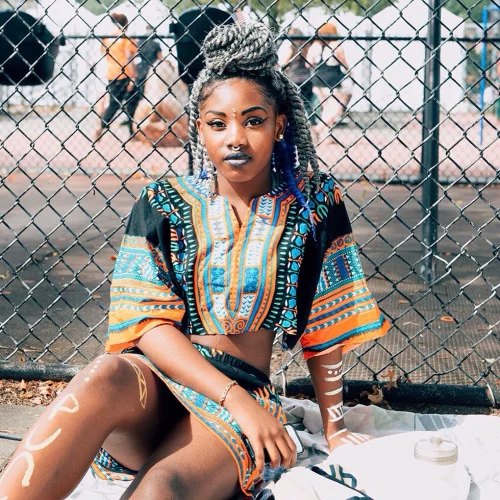On Dashikis & Face Paint: Decolonizing the African Culture Line
Recently, a post written by Zipporah Gene posed the question, “Can Black people culturally appropriate one another? The piece accused African Americans of committing cultural appropriation in the same way white people do. Needless to say, her piece has caused quite the stir on my Facebook timeline. Though well intentioned, she missed the mark tremendously. By asserting that Black people are guilty of the same appropriation that whites are, the author failed to factor in the forced dislocation of an entire population of African people and dismissed their attempts at reconfiguring any semblance of African identity, which brings me to my thesis.When native African people restrict the cultural involvement of others based on their Diasporic location, they implicitly perpetuate the same colonialism that separated Africans from Africa.Cultural appropriation is defined as the adoption or use of elements of one culture by members of a different culture as a largely negative phenomenon. In Gene’s piece, she states that Black Americans, because of their misuse of African fashion and tribal markings, are responsible for the same type of cultural appropriation that white people are. Though well-meaning, she has a very eurocentric way of looking at things, including her own people. However, this isn't unique to her. Quite honestly, it’s a problem that many people across the diaspora have when attempting to make cultural distinctions among themselves.
The reason this piece garnered so much support is simple––colonialism. Attempting to define someone else’s Africanness by where they fall on the globe is a direct byproduct of the colonialism that removed Black people from Africa in the first place. It is deeply misguided and disrespectful to disqualify non-native Africans from partaking in African customs and practices solely because of their dislocation from the continent. Such narrow and exclusionary definitions––cultural and otherwise––reinforce the colonial separation people across the Diaspora are still grappling with today.
This line of reasoning shames non-native Africans for a problem that they did not start. Black Americans, Afro-Brazilians, West Indians, and others are not responsible for their dislocation from the Motherland. Need we be reminded that during the Trans-Atlantic Slave Trade, approximately 11,863,000 Africans were shipped across the Atlantic, with a death rate during the Middle Passage reducing this number by 10-20 percent. As a result between 9.6 and 10.8 million Africans arrived in the Americas. Do these facts make those who traveled that tumultuous middle passage and their ancestors less African? Of course not! Black people have just as much stake in the continent as native Africans do. This includes access to traditional African religions, customs, and rituals, and most certainly includes the right to wear a dashiki.
Our relationship to African practices directly correlates to how we identify with the continent itself, both ideologically and culturally. Many Africans––both on and off the continent––tend to identify more with their specific region than with the continent as a whole. As a result, they define their differences based on the territorial demarcations that they have known all their lives. However, unbeknownst to them, most of these demarcations are colonial in nature and were imposed on them by white powers. When we use these same distinctions to isolate one Black culture from the next, we are reinforcing the white supremacy that begat it to begin with. This becomes clear when engaging in conversations regarding intracultural appropriation.
To be clear, appropriation is a viable concern and it is problematic when we don’t take time to educate one another on the the customs we are choosing to adopt. In the states, Black people, like white people, benefit from American privilege. As we all know, some Black Americans use their privilege to disregard and lump the diversity of Africa into stereotypical slogans and catchphrases. Some utilize this same privilege even more by not educating themselves on their own cultures and customs. And although this is indicative of a certain kind of privilege, it isn't appropriation. When Black Americans and others within the Diaspora employ aspects of African culture, they do so in an attempt to associate themselves with their long lost homeland. Some do this more consciously than others, but regardless of the surface-level motivation, it is all rooted in a genuine desire to connect with a stolen legacy.
Conversely, first generation Africans in America have the privilege of identification and access to customs that Black Americans and others across the Diaspora do not due to their native affiliations. When this association to Africa is leveraged to exclude other Africans (native or not), this claim to relative fame only promotes a false sense of entitlement to Africa that is based on location instead of ancestry.
Recognizing the dislocation of nearly 169 million African people from the continent, conversations like these must be had. While there may indeed be a misuse of African customs and symbols by Black Americans in the U.S., this should not be classified asappropriation. If anything, it highlights our relentless attempt to create an identity of Africanness here in the states, despite the dislocation we've had imposed on us. The sooner our native Africans brothers and sisters see that, the better.




